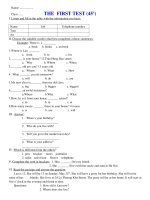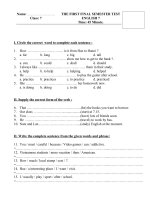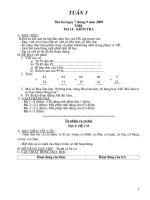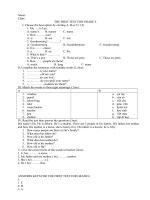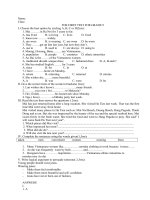3
Bạn đang xem bản rút gọn của tài liệu. Xem và tải ngay bản đầy đủ của tài liệu tại đây (101.5 KB, 11 trang )
<span class='text_page_counter'>(1)</span><div class='page_container' data-page=1>
<b>English test for grade 7</b>
<b>test yourself</b>
<b> 5</b>
<b>I. Complete the sentences with </b><i><b>used to</b></i><b> or </b><i><b>didn’t use to</b></i><b> and the verbs in the box.</b>
<b>play wash be eat like travel live work read get up</b>
1. I _____________ in the countryside when I was a child.
2. My mother _____________ coffee but now she loves it.
3. Julian _____________ much, but Harry Potter changed his attitude.
4. Dave _____________ in a football team but now he plays basketball.
5. The children _____________early because they had to get to school at 7 o’clock.
6. The shop _____________ so crowded as it is nowadays.
7. In those days, people _____________ all their clothes by hand.
8. I _____________ in a restaurant before I went to college.
9. People _____________ so much junk food, their diet was healthier.
10. When my father was young, he _____________ abroad so much.
<b>II. Write sentences, using the prompts and then correct form of </b><i><b>used to</b></i>.
1. We/ live in a flat when I was a child.
_________________________________________________________________
2. People/ not have/ mobile phones 20 years ago.
_________________________________________________________________
3. Jim/ go/ swimming every weekend?
_________________________________________________________________
4. My father/ smoke/ but he gave up five years ago.
</div>
<span class='text_page_counter'>(2)</span><div class='page_container' data-page=2>
5. Lily/ not cook/ much, but now she makes dinner every day.
_________________________________________________________________
6. There/ be/ a supermarket on the corner?
_________________________________________________________________
7. People/ not buy/ so much stuff as they do today.
_________________________________________________________________
8. You/ play football or basketball at school?
_________________________________________________________________
9. I/ go/ to bed very late but not anymore!
_________________________________________________________________
10. Which TV programme/ you/ watch/ most/ when you were little?
_________________________________________________________________
<b>III. Complete the dialogue with the correct form of </b><i><b>used to</b></i>
John:
Sally:
John:
Sally:
John:
Sally:
What (1) _____________ (you/ be) like when you were a child?
I (2) _____________ (wear) very thick glasses, and I(3)__________
(be) quite short. To be honest, I (4) _____________ (not like)
myself very much.
What (5) _____________ (you/do) for fun?
Oh, we (6) _____________ (not have) phones or technology of any
kind and the streets (7) _____________ (be) safer than now, so we
(8) _____________ (play) outdoors all the time.
</div>
<span class='text_page_counter'>(3)</span><div class='page_container' data-page=3>
<b>IV. Choose the correct answers</b>.
1. I ____________ a lot when I was younger.
a. use to swim b. used to swim
c. used to swimming d. didn't used to swim
2. People__________ so often, or they just didn't travel at all.
a. used to travel b. used not to travel
c. didn't used to travel d. didn’t use to travel
3. My brother__________ his leg in a car accident when he was 20.
a. broke b. used to break c. uses to break d. breaks
4. _________long hair when you were a teenager?
a. Used you to have b. Did you used to have
c. Did you use to have d. Are you used to having
5. My Grandpa never__________ coffee. He always drank tea.
a. uses to like b. used to like c. didn't use to like d. is
used to like
6. She________ as a teacher for many years before she became a writer
a. didn't use to work b. used to worked c. used to work d. worked
7. There______ a bus station there. When was it built?
a. used to be b. usedn't to be c. didn't use to be d. used not being
8. Dominic _________ to bed late on Fridays and Saturdays.
a. usually goes b. uses to go c. doesn't use to go d. is
used to go
</div>
<span class='text_page_counter'>(4)</span><div class='page_container' data-page=4>
a. Nancy used to like b. used Nancy to like
c. did Nancy used to like d. did Nancy use to like
10. He _______several books a month, but he doesn't have time any more.
a. usually reads b. used to read c. used to reading d. didn't use to read
<b>V. Write sentences with </b><i><b>it</b></i><b>, using the cues given.</b>
Example: 700 metres/ my house/ gym
It is about 700 metres from my house to the gym.
1. 150 million kilometres/ Earth/ sun
_____________________________________________________________
2. 105 km/ Hanoi/ Hai Phong.
_____________________________________________________________
3. 500 metres/ my house/ my school
_____________________________________________________________
4. 170 km/ Quy Nhon City/ Pleiku City
_____________________________________________________________
5. not very far/ here/ Tan Son Nhat Airport
_____________________________________________________________
6. a long way to go/ Hue/ Ho Chi Minh city
_____________________________________________________________
<b>VI. Write sentences, using the cues given.</b>
Example: your house/ school/ 2 kilometres/ go/ bike.
A: How far is it from hour house to school?
</div>
<span class='text_page_counter'>(5)</span><div class='page_container' data-page=5>
A: How do you go to school?
B: I go to school by bike.
1. your village/ the town/10 kilometres/ travel/ motorbike
A: _____________________________________________________
B: _____________________________________________________
A: _____________________________________________________
B: _____________________________________________________
2. Nga’s house/ her grandparents’ house/ 700 metres/ go/ foot
A: _____________________________________________________
B: _____________________________________________________
A: _____________________________________________________
B: _____________________________________________________
3. your hometown/ Ho Chi Minh city/ 900 kilometres/ travel/ train
A: _____________________________________________________
B: _____________________________________________________
A: _____________________________________________________
B: _____________________________________________________
4. Jim’s office/ the restaurant/ not very far/ go/ walk
A: _____________________________________________________
B: _____________________________________________________
A: _____________________________________________________
B: _____________________________________________________
</div>
<span class='text_page_counter'>(6)</span><div class='page_container' data-page=6>
1. Mai used to go to school __________ food when she was ________ primary school.
2. My father usually travels to Hanoi ____________plane.
3. Mai often cycles round the lake _________Saturday morning.
4. What are you doing ________ the weekend?
5. We were stuck __________a traffic jam for over two hours.
6. How far is your school________ your house?
7. I got ___________at the wrong stop and had to wait ________another bus.
8. Yesterday I saw a horrible accident__________ my way home from school.
9. Many years ago, people didn't use to be worried__________traffic jams.
10. It's illegal _________women to drive __________ Saudi Arabia .
<b>VIII. Write questions for the underlined parts </b>
Ann:
Huan:
Ann:
Huan:
Ann:
Huan:
Ann:
Huan:
Ann:
Huan:
Ann:
Huan:
Hi Huan! (1)___________________________________________
I came to class late this morning because I was stuck in a traffic jam.
Really? (2)________________________________________
Yes, my house is rather far from school
(3)_______________________________________________
Um...about 5 kilometres
(4)_______________________________________________
I go to school by bike.
(5)_______________________________________________
It takes me about 30 minutes. And it takes longer when the traffic is
jammed.
</div>
<span class='text_page_counter'>(7)</span><div class='page_container' data-page=7>
Ann:
Huan:
Ann:
Huan:
Ann:
Huan:
I get stuck in a traffic jam once or twice a week.
(7)______________________________________________
I often get stuck in a traffic jam on Monday morning.
(8)________________________________________________
I usually go to school at 6.15.
So why don't you start to school a little earlier on Monday?
Okay, I'll try
<b>IX. Put the dialogue into the correct order. </b>
___ Oh, I thought I could make a right turn on red here.
___ Here's your ticket. Please drive safely, ma'am.
___ Thank you, sir.
_1_ Sir, did I do anything wrong?
___ No, ma'am. The sign says "No Turn on Red."
___ Yes, ma'am. Didn't you see the red light?
___ May I see your driver's license and insurance policy, please? I have to give you a
ticket.
___ Oh, I guess I didn’t see it.
___ Here they are
___ Have a nice day, ma’am.
<b>X. Fill in each blank with a word from the box</b>
<b>safest vehicles only far crossroad follow across reason</b>
</div>
<span class='text_page_counter'>(8)</span><div class='page_container' data-page=8>
That can be dangerous as passing (3) __________ do not slow down unless there is a signal
or a crossroad. This is the (4)____________ why pedestrian crossings and intersections are
the (5)__________ places to cross. Children should cross (6)_________ at an intersection
and use the pedestrian crossing. If they are in a small neighborhood where there is no
(7)___________ should (8)____________ the rule 'stop, look both ways and cross'.
<b>XI. Read the text carefully, then do the tasks.</b>
<b>THE FIRST ELECTRIC TRAFFIC LIGHTS</b>
In the early 1900's, the world was developing at a very rapid pace, and with the
growth of industrialization, cities became more crowded. Furthermore, with the invention
automobiles, the traffic on the roads increased significantly, so there was a need for a better
traffic system.
In 1912, an American policeman, Lester Wire, who was concerned with the
increasing traffic, came up with the idea of the first electric traffic light. Based on Wire's
design, the lights were first installed in Cleveland, Ohio, on August 5, 1914, at the corner of
105th and Euclid Avenue
The first electric traffic light had only red and green lights; it did not have a yellow
light like modern- day traffic signals. Instead of a yellow light, it had a buzzer sound that
was used to indicate that the signal would be changing soon.
In the year 1920, a policeman named William Potts in Detroit, Michigan invented
the first four-way and three-coloured traffic lights. Apart from red and green, a third colour
- amber (or yellow) - was introduced. Detroit became the first city to implement the
four-way and three-colored traffic lights. In the 1920's, several automated traffic signals were
installed in major cities around the world. The modern traffic light still uses this famous
T-shaped model with three different colors.
<b>A. Decide whether the following sentences are true (T) or false (F). </b>
</div>
<span class='text_page_counter'>(9)</span><div class='page_container' data-page=9>
3. The first electric traffic light had red, green and amber lights.
4. The yellow light didn’t exist until the 1920s.
5. Detroit was the first city to use the red, yellow, and green lights to control road traffic.
6. The modern traffic light works on the same principle as Wire’s original light.
<b>B. Answer the questions</b>
1. When was the first electric traffic light invented?
_______________________________________________
2. Who invented the first electric traffic light?
_______________________________________________
3. How many colours did the first electric traffic light have?
_______________________________________________
4. Where were the lights first installed?
_______________________________________________
5. What was used instead of yellow light to warn everyone of a signal change?
________________________________________________
6. When was the yellow light added?
________________________________________________
<b>XII. Arrange the words to make meaningful sentences. </b>
1. big/ traffic congestion/ can/ what/ do/ to/ we/ reduce/ cities/ in?
____________________________________________________________________
2. is/ the/ your/ train station/ how/ hotel/ to/ far/ it/ from ?
</div>
<span class='text_page_counter'>(10)</span><div class='page_container' data-page=10>
3. my/ it/ not/ is/ far/ very/ house/ from/ to/ school.
____________________________________________________________________
4. think/ I/ it's/ time/ to/ do/ to/ reduce/ in/ something/ traffic jams/ Vietnam.
____________________________________________________________________
5. used/ school/ on/ Mai/ foot/ she/ to/ go/ to/ was/ in/ when/ primary school.
____________________________________________________________________
6 there/ city center/ traffic jams/ are/ the/ in/ rush hour/ often/ the/ in.
____________________________________________________________________
7. about/ people/ use/ in/ worry/ the past/ traffic/ didn't/ congestion/ to.
____________________________________________________________________
8. wear/ a/helmet/ compulsory/ is/ when/ in/ it/ to/ riding/ Vietnam/ a/ motorbike.
____________________________________________________________________
<b>XIII. Complete the second sentences so that it has the same meaning as the first. </b>
1. I went swimming every Thursday when I was at school.
I used ____________________________________________________________
2. Mai walked to school when she was in primary school.
Mai went __________________________________________________________
3. Why don't we cycle to the town at the weekend?
How about ________________________________________________________?
4. The distance between my house and the nearest bookstore is about 2 kilometres
It ________________________________________________________________
5. The airport is not far from the hotel.
</div>
<span class='text_page_counter'>(11)</span><div class='page_container' data-page=11>
6. What’s the distance from Madrid to Barcelona?
How ______________________________________________________________
7. Turn left into Lavalle Street and then go straight ahead.
Make _____________________________________________________________
8. Did your father use to drive to work?
</div>
<!--links-->

